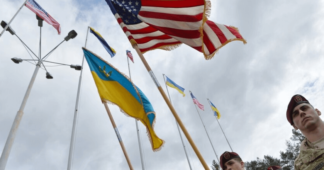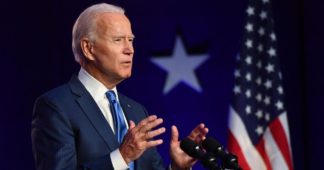By |
Mar 28, 2022
Previewing President Biden’s trip to Europe last week, US National Security Advisor Jake Sullivan said that, “the president is traveling to Europe to make sure we stay united.”
That sure didn’t go as planned. This may have been the most disastrous – and dangerous – Presidential overseas trip ever.
The US and its NATO allies have repeatedly proclaimed that “protecting Ukraine’s democracy” has never been about threatening Russia. Holding out NATO membership and sending billions of dollars in military equipment to Ukraine, starting under Trump, was not threatening Russia. CIA training camps in eastern Ukraine, where paramilitaries were trained on US weapons systems, was not about threatening Russia.
But at every stop, President Biden seemed to undermine the narrative his own Administration had carefully crafted. First up, warning that Russia might use chemical weapons in Ukraine, Biden promised it would “trigger a response in kind,” meaning the US would use chemical weapons as well. That would be a serious war crime.
National Security Advisor Sullivan had to be brought to explain that the US has “no intention” of using chemical weapons.
Later, speaking to the 82nd Airborne in Poland, President Biden told them that US troops would soon be in Ukraine. He said to the troops, “you’re going to see — you’re going to see women, young people standing — standing the middle of — in front of a … tank, just saying, ‘I’m not leaving. I’m holding my ground.’”
A White House spokesman had to clarify that, “the president has been clear we are not sending US troops to Ukraine and there is no change in that position.”
Clear? Well, not really. He had just said the opposite to our own troops!
Then, at the end of Biden’s final speech in Poland, the President inadvertently told the truth: the US involvement in Ukraine is all about “regime change” for Russia. Speaking of Russian President Putin, he told the audience, near the border of Ukraine, “for God‘s sake, this man cannot remain in power.”
The President’s disaster control team immediately mobilized in the person of Secretary of State Antony Blinken, who offered this pained interpretation of Biden’s clear statement, “I think the president, the White House, made the point last night that, quite simply, President Putin cannot be empowered to wage war or engage in aggression against Ukraine or anyone else.”
No, that’s not what he said. The president has a leading Constitutional role in the formation of US foreign policy, and he said in a public speech that “regime change” in Russia is US policy. Any attempt by his staffers to try to explain it away looks terrible: either the President has no idea what he’s saying so we should not take seriously what is essentially a declaration of war on Russia, or the President took the opportunity on the border with Ukraine to essentially declare war on Russia.
Presidents Reagan, Ford, and Bush Jr. were all known for their gaffes. Some were funny and some were serious. But none of them declared war on a nuclear-armed adversary in that adversary’s own backyard and then afterward had to send out staff to explain that the president didn’t mean what he just said.
Interestingly, Biden saved his most hawkish and bombastic statements for this final speech in Poland, at which none of the more cautious NATO partners like Germany and France were present. So much for “unity” being the prime purpose of the trip.
There is a real problem in the Biden Administration and the sooner we face it the better.
Published at www.ronpaulinstitute.org
We remind our readers that publication of articles on our site does not mean that we agree with what is written. Our policy is to publish anything which we consider of interest, so as to assist our readers in forming their opinions. Sometimes we even publish articles with which we totally disagree, since we believe it is important for our readers to be informed on as wide a spectrum of views as possible.











